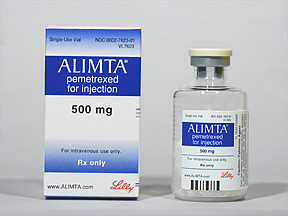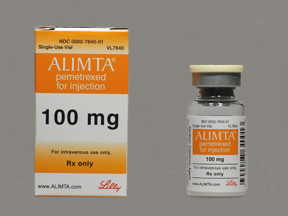PEMETREXED - INJECTION
PHONETIC PRONUNCIATION: (PEM-e-TREX-ed)
COMMON BRAND NAME(S): Alimta
GENERIC NAME(S): pemetrexed disodium
Uses
USES: Pemetrexed is used to treat certain types of cancer (such as lung cancer, mesothelioma). It is a chemotherapy drug that works by slowing or stopping the growth of cancer cells.
How to use PEMETREXED - INJECTION
HOW TO USE: Read the Patient Information Leaflet if available from your pharmacist before you start receiving pemetrexed and each time you receive a dose. If you have any questions, ask your doctor or pharmacist. This medication is given by injection into a vein by a healthcare professional. It is given over 10 minutes as directed by your doctor, usually once every 3 weeks. The dosage is based on your medical condition, body size, and response to treatment. To lower your chance of having a skin reaction while using pemetrexed, your doctor will prescribe a corticosteroid medicine (such as dexamethasone) to take for a short period around the time of each treatment. Consult your doctor or pharmacist for more details. To lower your chance of other side effects, it is very important that you take folic acid vitamins and receive vitamin B12 shots before and during treatment with pemetrexed. Folic acid vitamins are available over-the-counter without a prescription, and folic acid can be found in many multivitamin products. Make sure your vitamin contains between 400 to 1000 micrograms (0.4 to 1 milligram) of folic acid. Take folic acid daily for at least 5 out of 7 days before your first dose of pemetrexed, during treatment, and for 3 weeks after your last dose of pemetrexed. If you need help choosing a folic acid vitamin, ask your doctor or pharmacist. Your doctor will give you a vitamin B12 shot into the muscle, usually 1 week before your first dose of pemetrexed and then once every 9 weeks during your treatment. Do not substitute vitamin B12 taken by mouth for the vitamin B12 shots. Consult your doctor or pharmacist for more details.
Side Effects
Precautions
Interactions
Overdose
Images
Reviews
Faq for PEMETREXED - INJECTION
Pemetrexed - Injection is used to treat certain types of lung cancer, including non-small cell lung cancer and mesothelioma.
Pemetrexed - Injection works by interfering with the growth of cancer cells and preventing them from multiplying.
Pemetrexed - Injection is administered by a healthcare professional through a vein (intravenous infusion) over a specified period of time.
Common side effects of Pemetrexed - Injection may include nausea, vomiting, diarrhea, fatigue, loss of appetite, rash, and low blood cell counts.
The frequency of Pemetrexed - Injection administration can vary depending on the specific medical condition and treatment plan, but it is usually given once every three weeks.
Pemetrexed - Injection should not be used in individuals who have severe kidney problems, are pregnant or breastfeeding, or have previously experienced severe allergic reactions to the drug.
The effectiveness of Pemetrexed - Injection may vary from person to person and can depend on factors such as the stage of cancer and overall health. It is important to follow the prescribed treatment plan and consult with a healthcare professional for specific expectations.
Yes, Pemetrexed - Injection is often used in combination with other chemotherapy drugs or targeted therapies to provide a comprehensive treatment approach for cancer.
Insurance coverage for Pemetrexed - Injection may vary depending on individual insurance plans and policies. It is recommended to check with the insurance provider for specific coverage details.
Disclaimer
IMPORTANT: HOW TO USE THIS INFORMATION: This is a summary and does NOT have all possible information about this product. This information does not assure that this product is safe, effective, or appropriate for you. This information is not individual medical advice and does not substitute for the advice of your health care professional. Always ask your health care professional for complete information about this product and your specific health needs.


No Reviews Yet